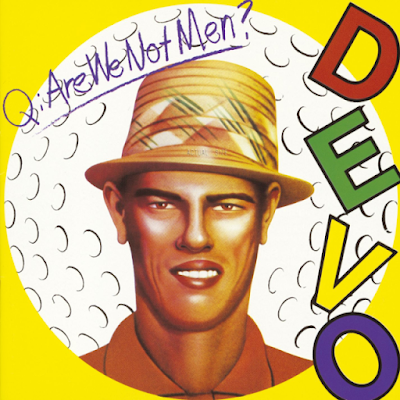Released
on August 28th, 1978, DEVO's debut LP, Q: Are We Not Men? A: We Are
Devo!, turns 45 years old today. After incubating their music and
philosophy over the course of some 5 years, the world was introduced to
the concept of "De-Evolution", the principal that humanity had peaked as
a species and was now backsliding into primitivism and ignorance.
Inspired
by the Kent State Massacre of 4 students on May 4th, 1970, co-founder
Gerald Casale began to formulate the basic principals of DeEvolution
into the band, DEVO, back in 1973. Along with co-founder, Mark
Mothersbaugh, brothers Bob 1 & Bob 2 and Alan Myers, the band spent
three years developing songs, stagecraft and iconography in order to
represent their vision of a degraded, displaced and disjointed dystopian
future. By 1977, the group were ready to record and their demo was
causing the likes of David Bowie, Iggy Pop, Robert Fripp and Brian Eno
to be in the running to produced the album. The job ultimately landed
with Eno, who flew the band out to Conny Plank's studio near Cologne,
Germany.
Production of the album ended up being something of a
battle of wills, as the band held steadfastly to conceptions about how
the songs should be produced, while resisting potentially beneficial
suggestions from Eno. In later years, band members would express
regrets over their stubbornness and refusal to collaborate more openly
with Brian. But despite the friction, they managed to produce an album
of tight, angular and innovative music, which would prove to be deeply
influential as upcoming young artists sought something more than the
three chord slash of punk.
I know my own reaction to the band
and the album was a sense of revelation. I saw them perform on Saturday
Night Live and was immediately won over by their quirky, alien
idiosyncrasy, which was counterbalanced by an uncanny sense of nostalgia
for mid century modern aesthetics. Parts of it reminded me of music
from Warner Bros cartoons, while other aspects left me feeling like I'd
stepped into a '50s science fiction B-movie. Coupled with their hazard
suited, herky-jerky robotic stage antics, you had the perfect formula
for fanatical DEVOtion!
While some critics at the time of its
release couldn't quite grasp what the band were doing, the album has
still managed to secure a solid position as essential listening from
that era, in the ensuing years since its release. It's an album I can
still listen to at any time and enjoy its strangeness, while marvelling
at its ability to resist sounding dated.





